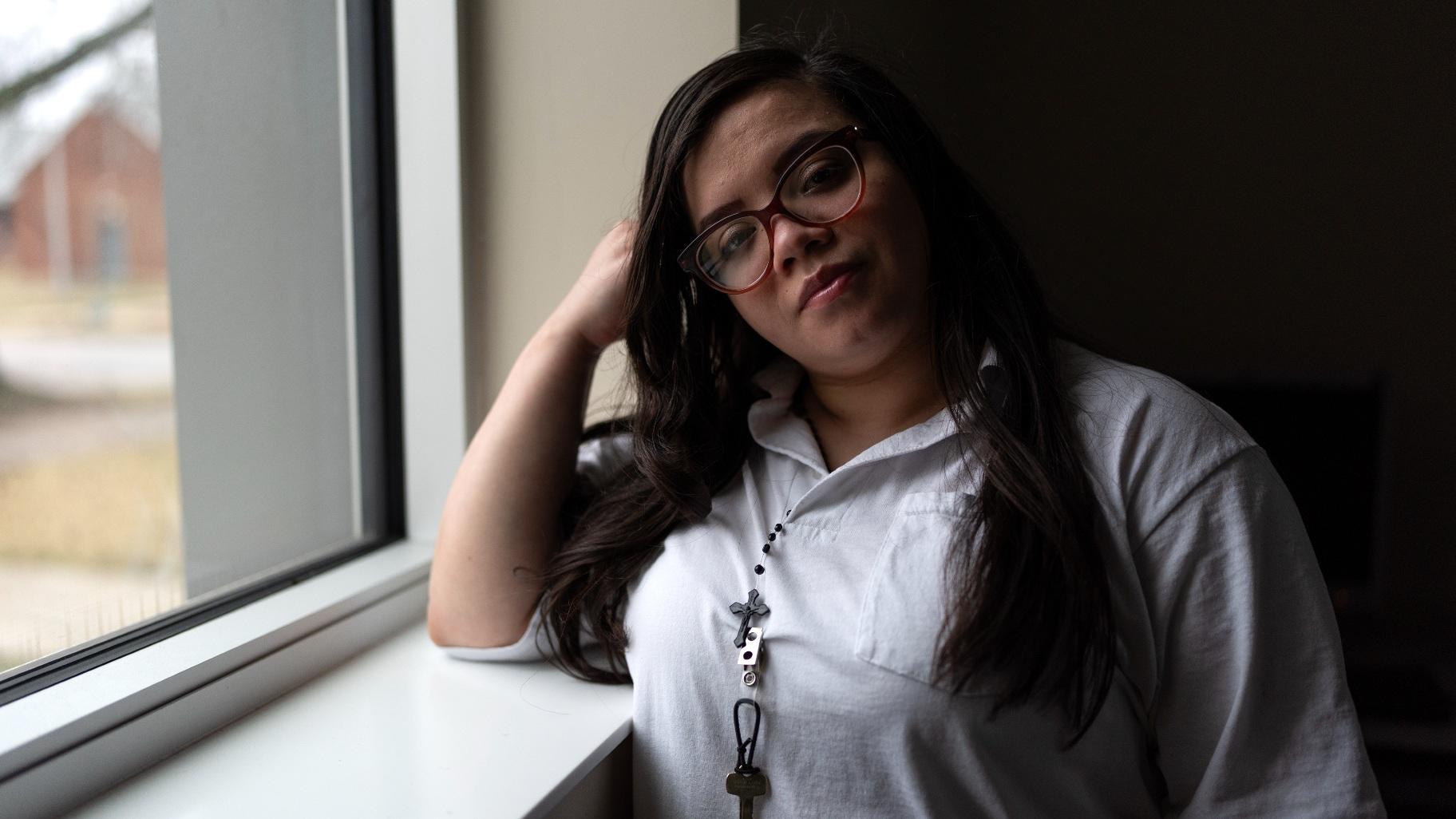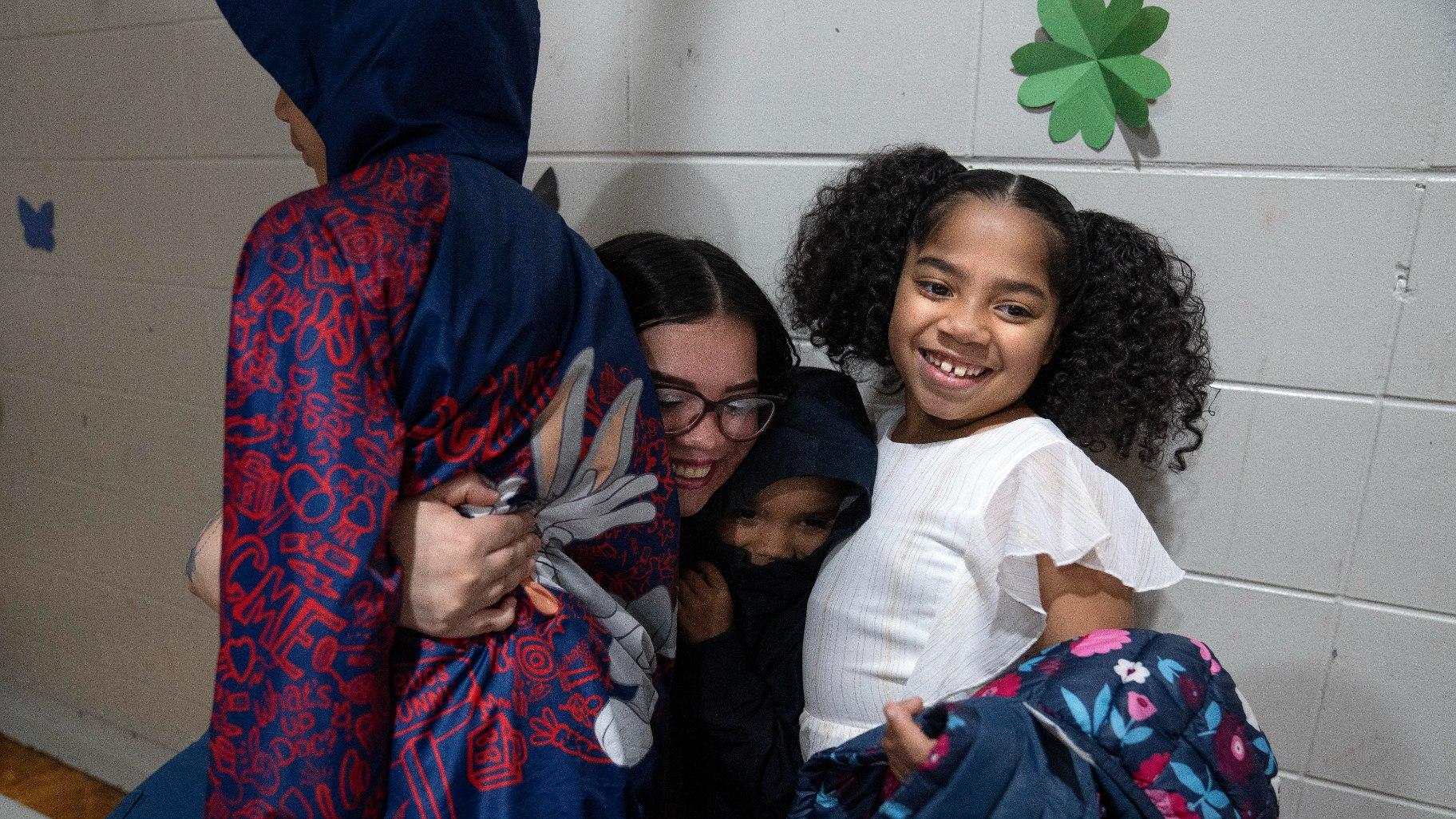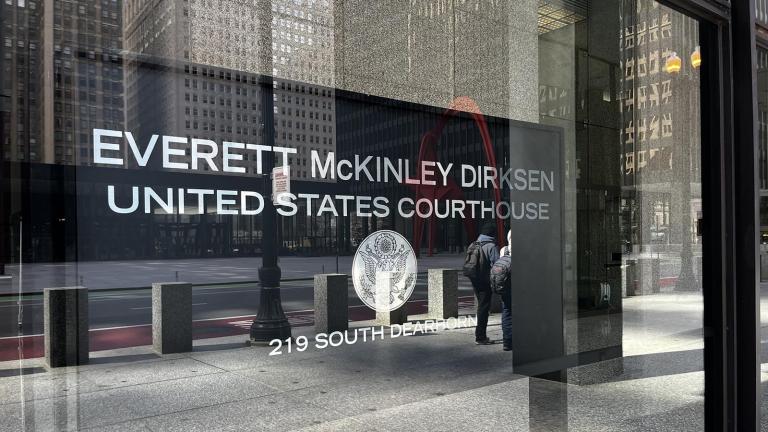 31-year-old Crystal Martinez stands for a portrait after speaking about her experiences with domestic violence and life in prison without her children Friday, Jan. 26, 2024, at Logan Correctional Center in Lincoln, Ill. (AP Photo / Erin Hooley)
31-year-old Crystal Martinez stands for a portrait after speaking about her experiences with domestic violence and life in prison without her children Friday, Jan. 26, 2024, at Logan Correctional Center in Lincoln, Ill. (AP Photo / Erin Hooley)
LINCOLN, Ill. (AP) — Women stream into the courtroom and sit shoulder to shoulder, coats bunched and bags on laps. Crystal Martinez, a human trafficking survivor, enters accompanied by a guard. Her face breaks into a teary smile at the sight of benches full of supporters.
Martinez, who has been incarcerated for more than two years in Illinois’ largest prison for women for shooting a man, was being resentenced under a rare Illinois law allowing judges to reduce jail time for some domestic violence survivors.
Martinez’s supporters hoped her case would indicate what other survivors of gender-based violence in Illinois could expect when a new law took effect last month that broadened who is eligible for resentencing. Instead, a recent Illinois Supreme Court ruling prompted panic that the law wouldn’t apply to many of them because they had pleaded guilty in their original cases.
Women who have experienced abuse are much more likely to be incarcerated than those who have not.
Sentencing reforms for survivors of domestic violence are rare in the United States. Only New York and California have statutes comparable to Illinois’ law, although similar reform efforts are underway in several other states.
To many gathered in the courthouse north of Chicago on Dec. 15, Martinez’s case represented not only her freedom but also a measure of how prosecutors could address other petitions. More than a dozen organizations, including the Illinois State Rifle Association, backed the 31-year-old mother of five in a letter to the Cook County State’s Attorney’s Office pushing for a sentence reduction.
From age 15, Martinez “was forced into prostitution where she was beaten without mercy, raped to no end and impregnated by her abuser,” her lawyer, Zac Ciullo, explained to Judge Lauren Edidin.
So when she saw another woman being abused in 2019, she intervened. A licensed concealed carry holder, Martinez shot and wounded a man she said was beating his girlfriend.
In August 2021, Martinez pleaded guilty to aggravated battery and was sentenced to eight years.
After months of work with Ciullo, Alexis Mansfield of Ascend Justice and the Women’s Justice Institute, and more, Martinez stood to tell her story. She asked the judge to reconsider her sentence, taking the events of her life into account.
"I didn’t want to stand there and watch him beat her like I’ve been beaten,” Martinez told Edidin. “I just was trying to do the right thing.”
 Crystal Martinez hugs three of her five children, from left, Reggie Johnson, 10, Jayceon Santiago, 5, and Myla Martinez, 6, during a special visit at Logan Correctional Center, Saturday, May 20, 2023, in Lincoln, Ill. (AP Photo / Erin Hooley)
Crystal Martinez hugs three of her five children, from left, Reggie Johnson, 10, Jayceon Santiago, 5, and Myla Martinez, 6, during a special visit at Logan Correctional Center, Saturday, May 20, 2023, in Lincoln, Ill. (AP Photo / Erin Hooley)
Her oldest daughter, Nevaeh Martinez, read a hand-written statement in court.
“All I want is for her to come home and be happy,” the 14-year-old said.
“I just want to be home with my children. They need me just like I need them,” Martinez told Edidin. She asked for the minimum sentence, which would cut two years off her total. The judge agreed.
“Trauma changes your brain,” Edidin told her. “Today, you took your power back.”
Martinez is scheduled for release on May 17.
In late November, the Illinois Supreme Court ruled that the defendant in People vs. Angela Wells was ineligible for resentencing because she had taken a plea deal. That decision threatened to jeopardize Martinez’s bid to be resentenced, as she had also pleaded guilty. She was allowed to proceed only because her resentencing hearing was already scheduled when the high court made its ruling.
Most criminal cases in the U.S. are resolved through plea bargaining, especially for defendants who cannot afford bail.
Illinois State Senator Robert Peters, who sponsored the gender-based violence resentencing law that went into effect in January, said the Wells decision contradicts the intent of the law.
“We need to recognize that there’s multiple Crystals that exist out there. Not just one person, but hundreds of people,” Peters said.
Unless new legislation is passed or the U.S. Supreme Court overturns Wells, Cook County will not be able to consider the resentencing petitions of defendants who pleaded guilty, said Michelle Mbekeani of the Cook County State’s Attorney’s Office, the prosecuting arm of Illinois’ most populous county.
“Going forward, Wells ties everyone’s hands,” Mbekeani said.
Weeks after her resentencing hearing, Martinez told The Associated Press that the years she is getting back with her family mean everything to her.
“To be incarcerated here with children on the outside, it’s like walking around with your heart outside your body,” she said during a follow-up interview at Logan Correctional.
Black and Hispanic women are more likely to be imprisoned than white women and are affected disproportionately by family separation due to incarceration.
Martinez, who identifies as Latina, said this translates into worse outcomes in the criminal justice system.








